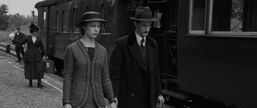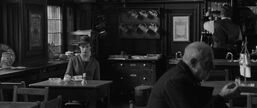There is an appointment for the best film tonight, and the French film "Franz" will be screened. At first, I watched the film and mentioned Willen, thinking it was a love film between the same sex, but after thinking about it, if it was, the plot concept would not make a good film; then as the plot proved my mistake, it was inferred that it was an ideological political film ; It is not until the end of the film that it is understood that this is a film about human nature.
The hope and pain of the entire film revolves around "Franz," which reveals the tragedy of human nature.
I'll go straight to the substance, less description: Franz, as a pacifist, was kidnapped on the battlefield, his rifle was unloaded, and it was the first confrontation between morality and divinity and human nature and prejudice. And the unsuspecting killing after the encounter with the film's hero is the second confrontation. Franz's father's first rejection of the male protagonist is the first confrontation between a French murderer who instinctively hates and kills his son and a rational understanding of tragedy. And it is the second conflict when the male protagonist is understood to be a close friend of "Franz" because of his weakness and makes the old man and his friends who lost his son fight rationally against perceptual knowledge. The arrival of the male protagonist relieves the pain in the family, brings hope to the female protagonist, and the excellent appearance of the male protagonist is a conflict between responsibility and humanity (here is a key point, the male protagonist contacts the victim's family as a close friend, A relationship without hatred wins the love of the female protagonist beyond Franz's love. Franz is excellent, but he does not have the "appearance" of the male protagonist); it is tragic that the guilt of the fiancé and in-laws caused by the lies being exposed is tragic The first manifestation. She doesn't think she deserves to be loved anymore! Actual suicidal behavior.
The weakness of the male protagonist makes the female protagonist despair, but the sincerity of the male protagonist after returning to Paris gives the female protagonist the hope of life again. After all, life has to go on! The heroine chose to like the hero (but this is not true love, just like the reason why Duke Andrei in War and Peace likes Natasha, the guilt and the weakness of the hero cannot form the original "color" )---The heroine has chosen a way to resolve the tragedy by allowing herself, her in-laws and the hero to return to life, which not only reflects the repetition of human nature, but also has goodwill.
The short-lived pain of the male protagonist returning to Paris was diluted by time and life, although he said that he "was in terrible pain". It's duty giving way to humanity, in contrast to his previous remorse at the "Franz" cemetery. Essentially, the male protagonist only feels that he owes "Franz", but he is unwilling to compensate the female protagonist from his heart. So, the female protagonist went alone, and the male protagonist retreated? If virtue, forgiveness and understanding truly triumph over humanity.
Another detail is that the female protagonist went to Paris alone to find the male protagonist. Because of the same surname and different names, she thought she died with hatred and became very sad (here is a detail, the male protagonist's tombstone shows that he already has a wife, and the sadness at this time transcends the reunion. The pursuit of life, but another remorse for hurting the male protagonist due to ruthlessness), it can be seen from this that the female protagonist is essentially a kind person.
The film ends with the famous painting "Suicide". ---Anna, who was a victim, ended up committing suicide. This time, the fantasy of hoping to combine with the male protagonist to change the tragedy of 4 people is completely shattered! She can't love her anymore. Anna, dead. Same as her fiancé. Isn't this person Karenina? She is!
Summary: 1. (male protagonist) Occasional bravery can only show stubbornness, (the details of the dance show that the male protagonist is a person who forgets his worries, and the wife of the person you killed is by your side!) Essentially unbearable The weakness of any responsibility; the real feeling is like a veil but it is not obvious, "I really want to die when I go back to Paris", and it is not that I will die if I make a mistake, but to say that only means that you are deceiving yourself.
2. Either don't make mistakes (hurt others), or be cold and don't insult others with apologies
3. "Franz" symbolizes the divinity of man, and there are three endings for those who have the character of "Franz" in this world:
1. (Franz) lost his life and dignity
2. (In-laws) Living in a lie, the in-laws want Anna to be happy
3. (Anna) Died of Despair
Therefore, morality, forgiveness, and understanding are vulnerable in the face of human nature. No matter whether it is a battlefield or not, tragedies are happening, and life is often very peaceful, but more painful!
The film is very good, with an anti-war theme, but it hits the nail on the head.
View more about Frantz reviews











